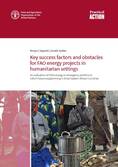تتضمن هذه الصفحة معلومات وروابط إلى مطبوعات وأدوات ودراسات حالة مفيدة تتعلق بالإدارة المستدامة للموارد الطبيعية والأنشطة المتصلة بسبل العيش للسكان الذين تطالهم حالات الطوارئ والأزمات الممتدة وفي حالات الإنعاش.
Increasing resilience in emergencies, protracted crises and rehabilitation
FAO’s response to the cooking and heating needs of affected populations in emergencies, protracted crises and recovery contexts focuses on ensuing sustainable natural resources management and diversifying livelihood activities. It contributes to FAO’s Strategic Programme 5 on increasing the resilience of livelihoods to threats and crises.
Vulnerable populations, including refugees and Internally Displaced Persons (IDPs) as well as the communities hosting them, are often exposed to a range of risks and challenges related to the collection, production and use of traditional biomass.
Safe Access to Fuel and Energy (SAFE)
FAO is a member of the inter-agency SAFE Humanitarian Working Group, along with WFP, UNHCR and the Global Alliance for Clean Cookstoves. FAO’s work on Safe Access to Fuel and Energy (SAFE) adopts a holistic, multi-faceted approach which takes into account the mutually reinforcing linkages between energy and environment, nutrition, health, gender, protection and livelihoods. This approach is comprised of three interlinked pillars:
- Ensuring a sustainable supply of energy through mapping, assessing and ensuring a reliable and sustainable source of fuel;
- Addressing energy demand through fuel needs assessments, the promotion of fuel-saving cooking practices and fuel-efficient technologies for cooking and productive uses;
- Promoting social and economic benefits and diversified livelihoods, both from fuel-related and other livelihood activities, in order to build resilience.
Key success factors and obstacles for FAO energy projects in humanitarian settings
The interaction between climate, conflict, hunger, poverty and persecution creates increasingly complex emergencies. According to UNHCR, by the end of 2019, the number of people forcibly displaced due to war, conflict, persecution, human rights violations and events seriously disturbing public order had grown to 79.5 million, the highest number on record according to available data. Crisis-affected populations – including refugees, internally displaced and the communities hosting them – often have severely constrained access to fuel and energy for cooking, heating and lighting.
This report reviewes FAO’s energy-in-emergency work carried out between 2014 and 2018, focusing on countries’ energy needs in the context of emergencies and protracted crises to build resilient livelihoods in a sustainable manner.

